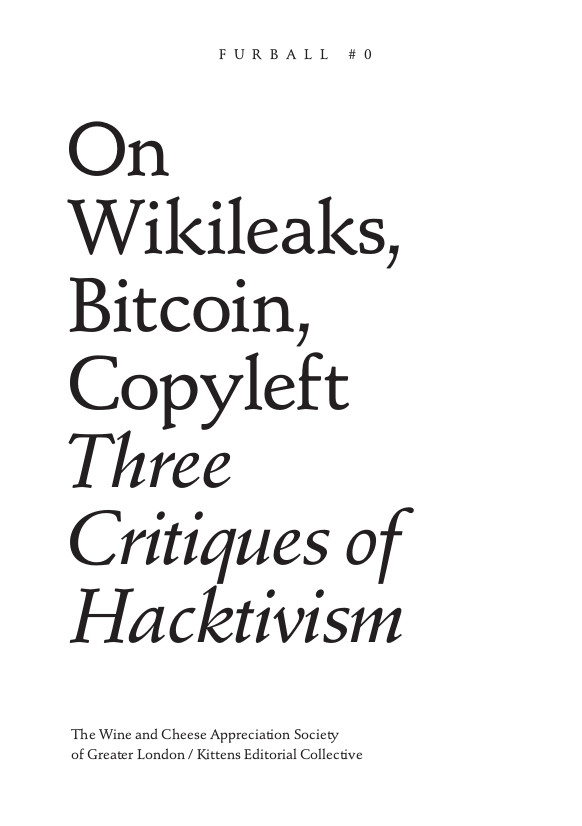Maurizio Lazzarato: The Making of the Indebted Man: An Essay on the Neoliberal Condition (2011–) [French, English]
Filed under book | Tags: · capitalism, debt, economics, money, neoliberalism, philosophy

“‘Debt—both public debt and private debt—has become a major concern of economic and political leaders. In The Making of the Indebted Man, Maurizio Lazzarato shows that, far from being a threat to the capitalist economy, debt lies at the very core of the neoliberal project. Through a reading of Karl Marx’s lesser-known youthful writings on John Mill, and a rereading of writings by Friedrich Nietzsche, Gilles Deleuze, Félix Guattari, and Michel Foucault, Lazzarato demonstrates that debt is above all a political construction, and that the creditor/debtor relation is the fundamental social relation of Western societies.
Debt cannot be reduced to a simple economic mechanism, for it is also a technique of “public safety” through which individual and collective subjectivities are governed and controlled. Its aim is to minimize the uncertainty of the time and behavior of the governed. We are forever sinking further into debt to the State, to private insurance, and, on a more general level, to corporations. To insure that we honor our debts, we are at once encouraged and compelled to become the “entrepreneurs” of our lives, of our “human capital.” In this way, our entire material, psychological, and affective horizon is upended and reconfigured.
How do we extricate ourselves from this impossible situation? How do we escape the neoliberal condition of the indebted man? Lazzarato argues that we will have to recognize that there is no simple technical, economic, or financial solution. We must instead radically challenge the fundamental social relation structuring capitalism: the system of debt.”
French edition
Publisher Éditions Amsterdam, 2011
125 pages
English edition
Translated by Joshua David Jordan
Publisher Semiotext(e), 2012
Intervention series, 13
ISBN 1584351152, 9781584351153
199 pages
Review: Nikolay Karkov (Canadian Society for Continental Philosophy, 2012).
Publisher (EN)
La Fabrique de l’homme endetté. Essai sur la condition néolibérale (French, 2011, updated on 2016-12-23)
The Making of the Indebted Man: An Essay on the Neoliberal Condition (English, 2012, updated on 2017-6-26)
Furball 0: On Wikileaks, Bitcoin, Copyleft: Three Critiques of Hacktivism (2013)
Filed under booklet | Tags: · bitcoin, capitalism, copyleft, critique, free software, hacktivism, money, software, wikileaks

“While most expressions of hacktivism lack this revolutionary vigour expressed in one of the later communiques by now infamous hacking collective AntiSec, hacktivism is widely appreciated for its radical potential. Wikileaks and hacking crews are considered by some as anarchist special forces striking blows against the forces of domination. Bitcoin is regarded as a practical approach to break the power of capital. Free software is thought of as a model for future production beyond capitalism. We disagree.
This booklet collects our writings on activism in the digital realm produced over the last few years. In our piece on Wikileaks — which first appeared in Kittens #1 — we critique Wikileaks’ appreciation of the bourgeois-democratic state which persecutes it. The article on Bitcoin — which previously appeared in Mute Magazine Vol. 3, No. 3 — deals with the political economy of the digital currency and critiques the Libertarian ideology driving it. Finally, our piece on free software and other digital commons — which has not previously been published — portrays how ‘copyleft’ software licences are still expressions of appreciation for the social conditions we are forced to live under.
All three pieces critique both the fallacies inherent in the reasoning behind these projects as well as left-wing hopes attached to them. As such, it might strike the reader as arrogant sneering from the sidelines. However, this is not the intent of this work. We hold that the project of transforming the existing social conditions must start from a correct understanding of these conditions to avoid reproducing them. In this spirit, this booklet is an invitation to critique.” (from the Foreword)
Publisher The Wine & Cheese Appreciation Society of Greater London, London, January 2013
46 pages
via Marcell, via Anthony
transversal, 01/13: The Languages of the Banlieues (2013) [EN, DE, FR, Arabic]
Filed under journal | Tags: · capitalism, cognitive capitalism, geopolitics, knowledge, knowledge production, labour, theory
“The crises within cognitive capitalism and cognitive labor are mirrored in the reproduction and exacerbation of global divisions of labor and the emergence of new forms of exploitation as part of a regime of flexible capital accumulation. While drastic austerity measures and heightened control mechanisms lead to a radical transformation of the welfare state on the one hand, new networks of communication, struggle and alternative forms of knowledge emerge on the other.
This issue of transversal attempts to review some of the general assumptions of a theory of cognitive capitalism and to unsettle the very notions of knowledge and its production, discussing the conditions of its capture, its “re-invention” and its capacity for creating worlds. The individual essays follow the lines of a (post-)colonial historicity and a feminist and geopolitical critique of capitalist valorization, thereby questioning the materiality of knowledge and its production in relation to resources and bodies, as well as how art and knowledge production are interwoven with political struggles.” (Editorial)
With contributions by Anne Querrien, Marc Hatzfeld, Amina Bensalah/Myriam Suchet, Boris Seguin, Sonia Chikh (Les engraineurs), Abdoulah Bensaid (Musik à Venir), Françoise Dibotto Soppi.
Editors: Lina Dokuzović, Therese Kaufmann, Raimund Minichbauer, Radostina Patulova
Publisher eipcp – European Institute for Progressive Cultural Policies, Vienna/Linz
Copyleft
ISSN 1811-1696
HTML (updated on 2020-4-18)
Previous issue

